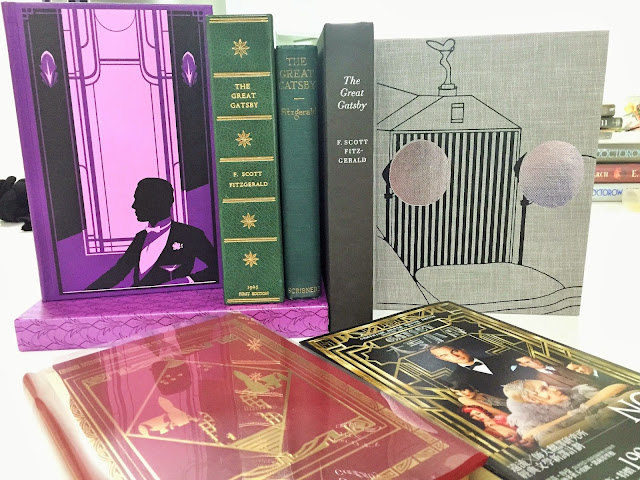The Great Gatsby Gala
--- "If personality is an unbroken series of successful gestures, then there was something gorgeous about him, some heightened sensitivity to the promises of life"
So this year marks the 90th birthday of The Great Gatsby, which was published on 10 April 1925, and since I have a little bit of time today, let's do a Gatsby Gala. Today, The Great Gatsby is generally considered one of the great American novels, portraying the decadence and flamboyance of the Jazz Age and the roaring 20s, and is the quintessential American dream. But the book had a lukewarm reception, both commercially and critically, when it was first published. It seems that the book did not grow in popularity under after 1945, five years after Fitzgerald passed on, and the initial reviews were, to put them mildly, mixed.
There are many beautiful editions of The Great Gatsby. What I have here are, in the foreground, the Franklin-Oxford edition in red and gold, and a Chinese translation paperback. The background, from left, are The Folio Society's edition, the true first edition without the famed dust jacket, and the Limited Editions Club edition.
So what is so great about The Great Gatsby? Besides Fitzgerald's inventive prose, I think it has to do how the story conveys different messages to readers over time. When I read it for the first time, it was, in Ayn Rand's style, all about "Who is Jay Gatsby?" Like John Galt in Atlas Shrugged, I was eager to find out more about this intriguing figure who held lavish parties and knew someone who could fix the World Series, and whose love for Daisy was so unwavering.
The next time, it was about social status, the importance of graduating from New Haven or being an Oxford man with legacy wealth. For example, Tom's pedigree seemed to vindicate his missteps, including the affairs with Myrtle, and constant drift to seek "the turbulence of some irrecoverable football game". Jay, on the other hand, will always be relegated as "one of the bunch that hangs around with Meyer Wolfshiem." Meyer Wolfsheim is an allusion to Arnold Rothstein.
Then it started to read like a modern Moby Dick, with Nick taking over Ishmael's role as the reliable narrator. Jay is an equally obsessive captain chasing his nemesis, Daisy, in the same way Captain Ahab wanted Moby Dick. Granted Jay was doing it out of love while Ahab did it out of hatred, both nevertheless shared a history with their respective obsessions, and love or hatred notwithstanding, the history created in them a desire, and then despair (not unlike the theme for street and salesman).
In 2008, while watching the quite impressive movie (another of Fitzgerald's adaptations), The Curious Case of Benjamin Button, it dawned on me that The Great Gatsby is perhaps best summed up by Benjamin Button's advice to her daughter: "I hope you live a life you are proud of. If you find that you are not, I hope you have the courage to start all over again." Jay did just that, and in Jennifer Egan's words: "The Great Gatsby captures something about the American psyche that most of us would recognize, which is a willingness to start over, reinvent ourselves, imagine a new life. In a way, that dream is a lot of what built this country."



Comments
Post a Comment